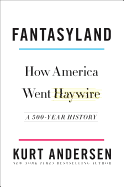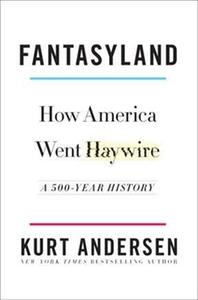
 Kurt Andersen's comprehensive history of American bunkum and balderdash, Fantasyland, is the work of a man with a particular picture to paint and a willingness to follow wherever the bizarre facts lead him. As he says, "I enjoy having my mind boggled." A versatile, funny guy born and raised in heartland Nebraska, Andersen left for Harvard to write for its Lampoon, co-founded the satirical magazine Spy, wrote three novels (including 2012's True Believers), and is host of NPR's Studio 360. While it may have been sparked by the presidency of Donald Trump, Fantasyland puts the latest political pandemonium into the broader context of the origins of the United States--a country built from scratch "where all citizens were officially freer than ever before to invent and promote and believe anything. So Americans promptly began believing almost everything."
Kurt Andersen's comprehensive history of American bunkum and balderdash, Fantasyland, is the work of a man with a particular picture to paint and a willingness to follow wherever the bizarre facts lead him. As he says, "I enjoy having my mind boggled." A versatile, funny guy born and raised in heartland Nebraska, Andersen left for Harvard to write for its Lampoon, co-founded the satirical magazine Spy, wrote three novels (including 2012's True Believers), and is host of NPR's Studio 360. While it may have been sparked by the presidency of Donald Trump, Fantasyland puts the latest political pandemonium into the broader context of the origins of the United States--a country built from scratch "where all citizens were officially freer than ever before to invent and promote and believe anything. So Americans promptly began believing almost everything."
A longlist of religious sects, out-there beliefs and fruitcake leaders kicks off Andersen's history, and he rolls out their appearances with both facts and farce decade after decade. Anne Hutchinson, Joseph Smith ("American Christians from the start tended toward the literal and hysterical and collectively self-centered. Joseph Smith met that bid and raised it a million"), Mary Baker Eddy, Norman Vincent Peale, Billy Graham, L. Ron Hubbard, Deepak Chopra: it's amazing how many of these outliers have commanded the attention and adoration of Americans. Although Andersen is a fan of neither mainstream nor backwater religion ("there are degrees of misguidedness"), he dutifully chronicles both camps.
When Fantasyland hits his own early years in the 1950s, however, Andersen's range and depth of examples of American delusions grows exponentially. The border between real and unreal disappears in the minds of those endlessly in "pursuit of happiness." Access to broadly disseminated media makes every tangent seem like a big deal. Andersen mines this mother lode--including the Gold Rush, patent medicines, Disneyland, beatniks, hippies, drugs, yoga, motorcycle gangs, shopping malls, fantasy sports, internet porn, Civil War reenactments, cosplay and LARP, adult coloring books and on and on. He is indifferent to the political origin of these fantasies, whether noting, for example, that John F. Kennedy was the first media-manufactured president (not Ronald Reagan), or that university intellectuals have gone "squishie" and seem afraid "to tell people they're full of shit when they are."
Still, it was the 2016 election that prompted Fantasyland, and after all his research, Andersen concludes that "Donald Trump is a pure Fantasyland being, its apotheosis... a stupendous Exhibit A." If centuries of American hogwash are too frightening, Andersen attempts to leave us with some indication that the pendulum may soon swing back to sanity: "The good news, in other words, is that America may now be at peak Fantasyland. We can hope." Whether this forecast proves accurate or not, his look back is one of the most audacious and entertaining American histories on any bookshelf. --Bruce Jacobs, founding partner, Watermark Books & Cafe, Wichita, Kan.
Shelf Talker: With wit and a large helping of research, novelist and satirist Kurt Andersen explores the background of America's penchant for believing the craziest of fantasies.

